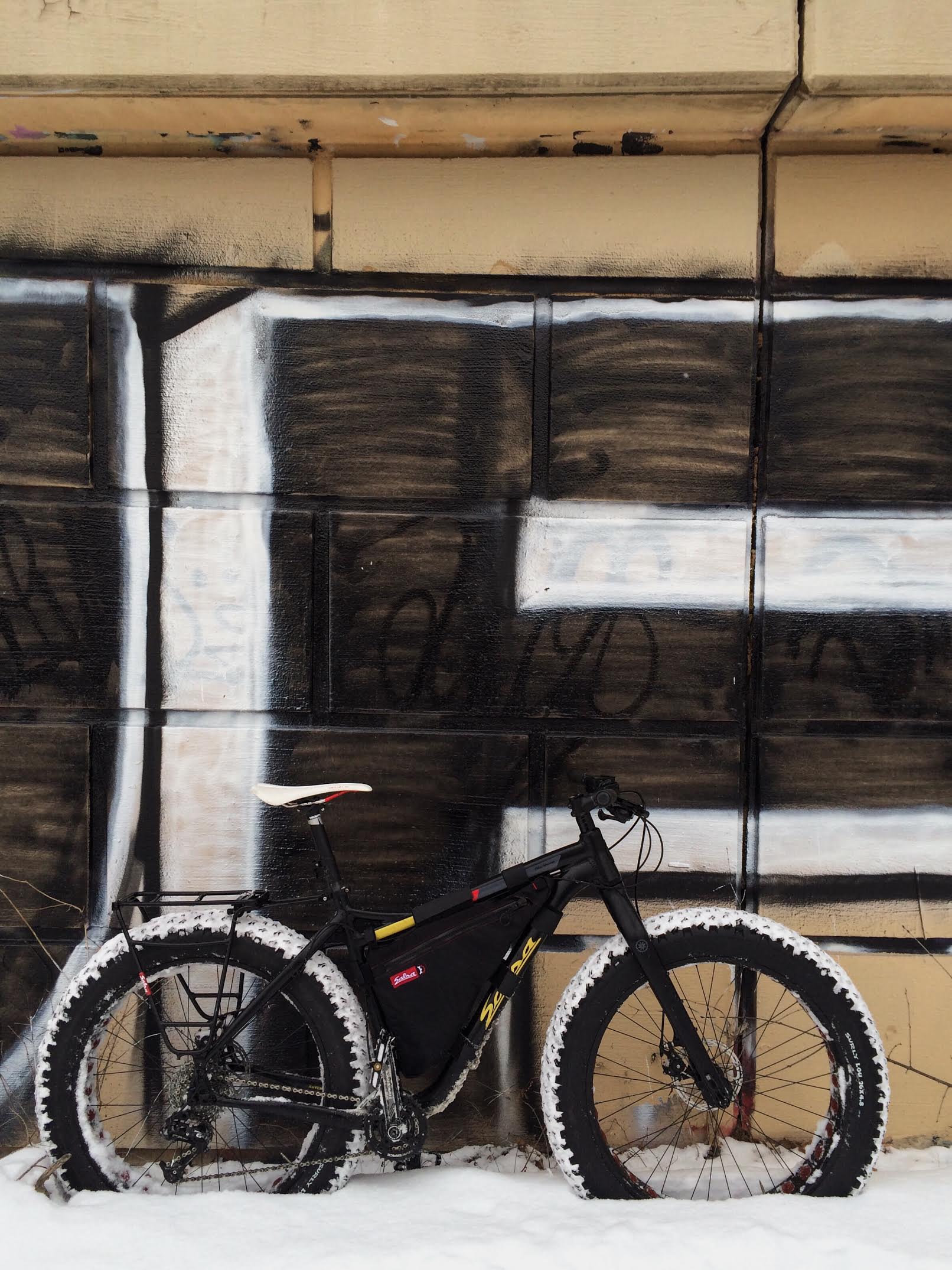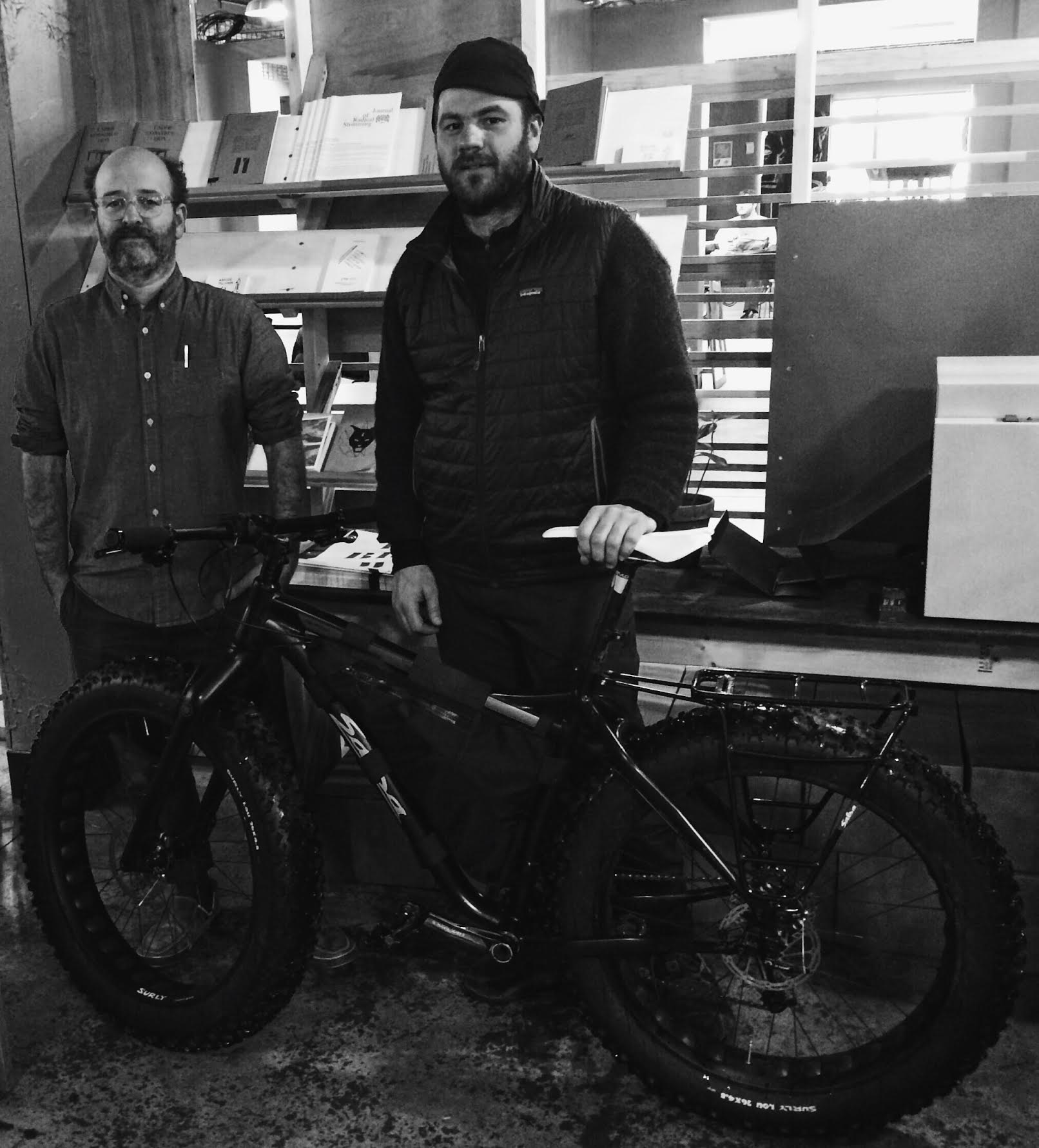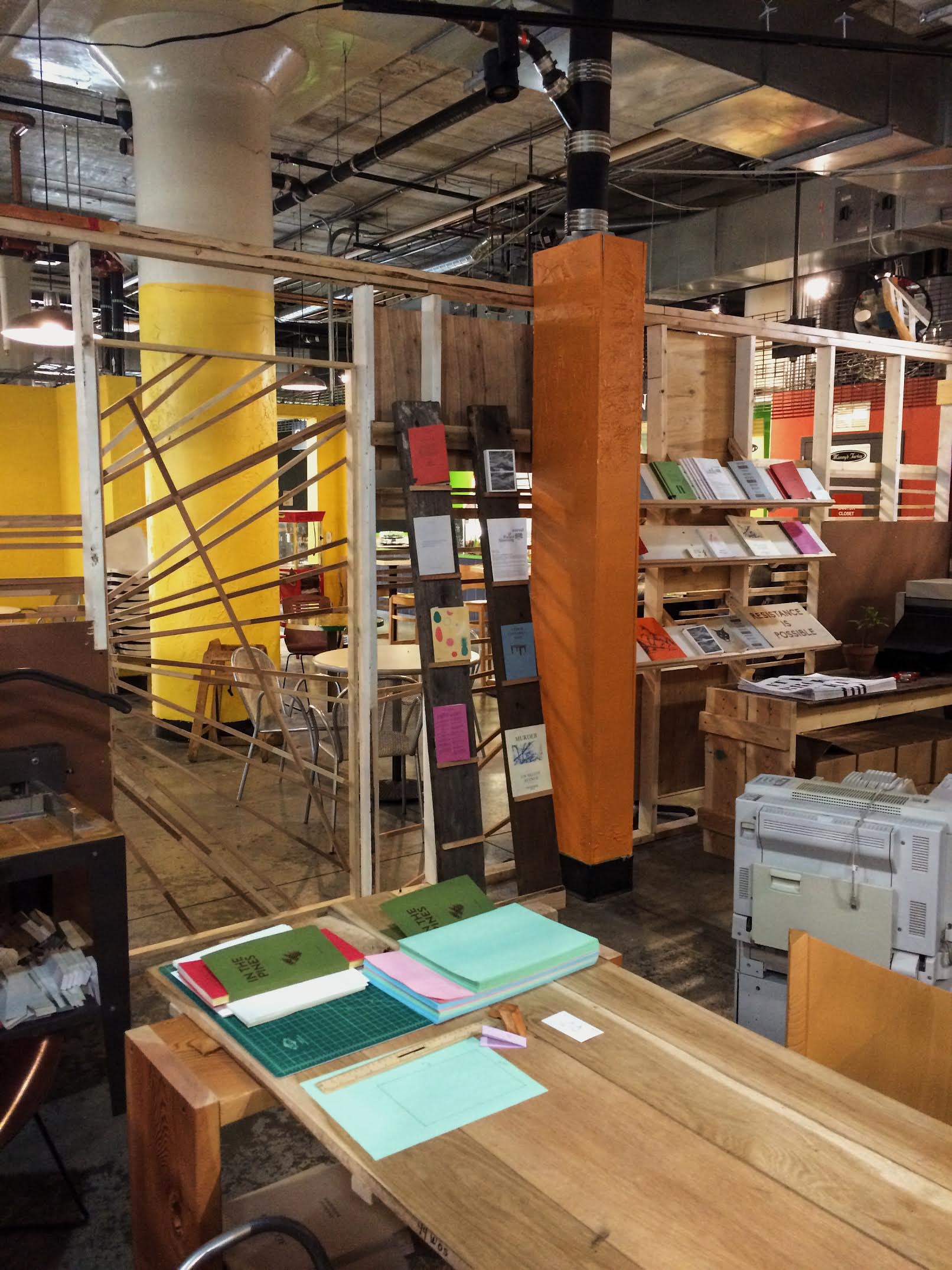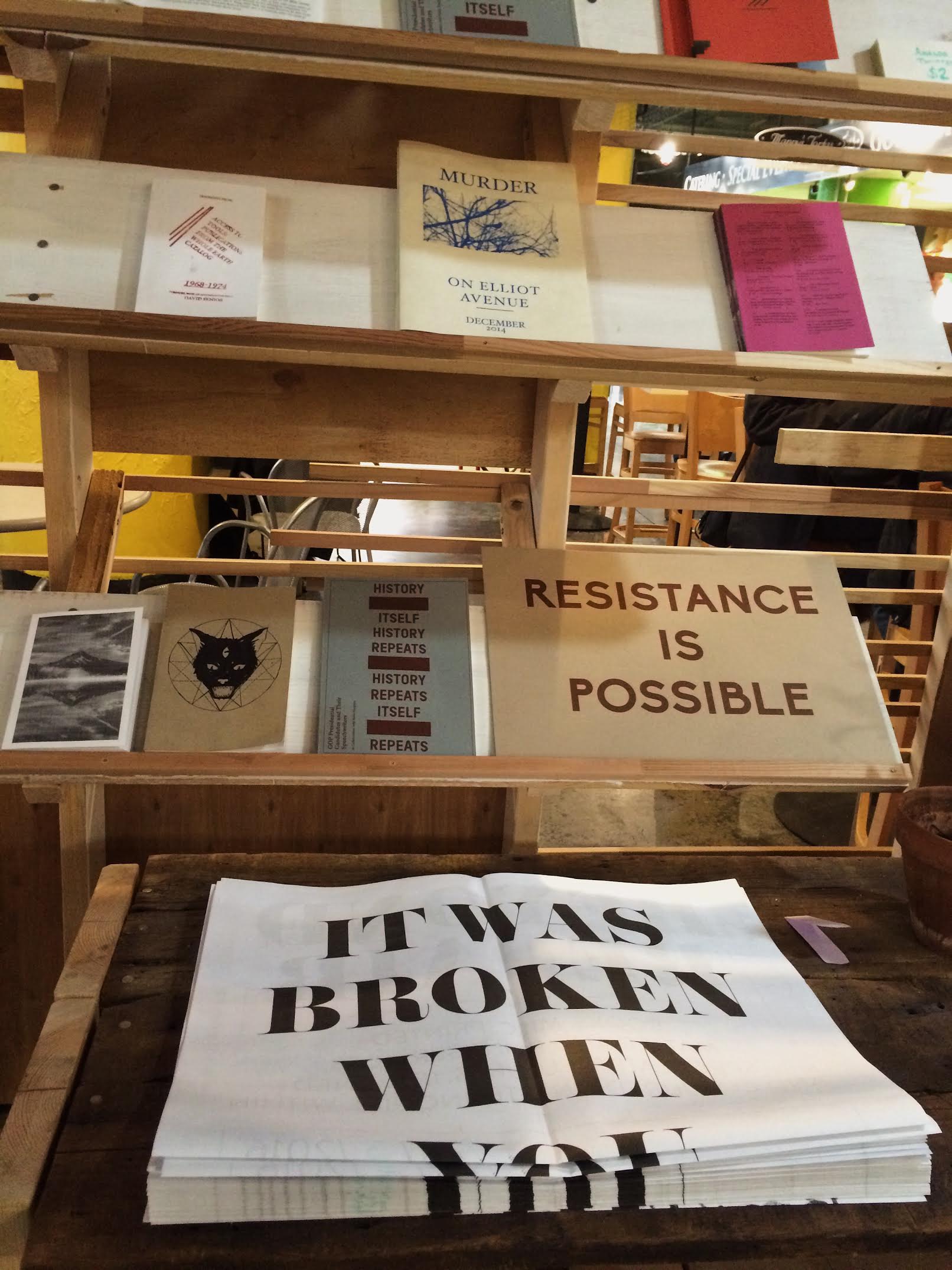Ramble Ramble: Beyond Repair
Musician Ben Weaver offers the first of several dispatches by bike, this time on artist Sam Gould's new storefront experiment in grassroots publication and activism: Beyond Repair, which recently set up shop in Minneapolis' Midtown Global Market.

Start talking to people who ride bicycles, and you will discover they have one thing in common regardless of their background, ability, or social group. People who bike regularly see more of the world. For some time, I have been hoping to stumble upon an outlet that would present me a platform to begin sharing the observations, stories, and questions piling up from my daily ramblings and travel by bike. The idea with this new series of articles for Mn Artists is to seek out art within the Twin Cities, ride my bicycle to see it, and then write about my experience, including how I got there. In sharing these reflections, I hope to inspire others to do the same and explore our cities by bicycle — in all kinds of weather, at any time of year.
Ramble is my verb of choice for these excursions, because it suggests that the direction taken, the process, and act of going are all impacted by things encountered on the way. Rambling introduces the possibility that relationships will be forged between the rambler and the landscape. And so, I’ll go: like a boulder knocked loose by the hoof of a climbing goat and sent down the mountainside, cast through snow fields, bouncing off other rocks, across streams, rolling by dens, nests, and cave openings.
The ropes around work in a gallery space define for the visitor what is art. The endcap in my neighborhood co-op holds plastic containers of pre-measured ingredients suggesting what to make for dessert. The radio tells us what music is good, and our phones tell us what our friends are doing at any given moment and whether or not they like what the rest of us are up to. National Parks, state parks, and wildlife areas tell us with signage on the grounds what constitutes nature. It’s a rarity to encounter something that stands to define itself, on its own terms, by its own will and without outside influence or determination. Wild boulders kicked loose by goats, careening down the mountain — truly self-willed experiences — are few and far between.
We talk about endangered and extinct species. As we lose these plants, animals, waterways and ecosystems, we are losing something else along with them — something that often gets overlooked because our focus tends to be on more tangible and measurable losses. When we lose species who inhabit wild spaces, we lose wildness itself. Not wilderness, wildness. And that’s a tragic loss, because wildness is essential — wild spaces, wild energy, wild conversations, ideas, and lives. We need the erratic, unpredictable trajectories of boulders kicked loose in order to lead awakened, vital, and change-embracing lives. The unpredictable, aperiodic flow of rivers and weather is wild. The Death Star-esque US Bank Stadium being erected in downtown Minneapolis is not. The colonies of bacteria in the soil beneath the IDS tower are wild; the new vegan butcher shop is not. Wild isn’t the Minnehaha dog park; it’s the peregrine falcon I saw strike a pigeon in mid-air and then proceed to eat it, perched atop a stoplight, as feathers snowed down on the unaware pedestrians walking beneath. We need more space for the wild in our day-to-day lives, for self-willed and uncontained experiences.
I’m not at all the first to mark such definitions. Thoreau noted that “wild” is the past participle of willed. Other writers — Gary Snyder, Terry Tempest Williams, Jack Turner, and Barry Lopez to name a few — have similarly worked to clarify the discrepancies between wildness and wilderness, and to explain why wildness is so essential to human life. I contend that wildness, our understanding of it and its presence in our lives, has a great deal to do with the birth and fecundity of relevant, vital, and emotionally immediate art.

SEVERAL WEEKS AGO, I went to see some friends read poetry at Beyond Repair, a new artist-driven space in the Midtown Global Market. The reading consisted of five men sharing poems about being fathers and artists. There were, maybe, 10 people besides myself and my partner in the audience.
Beyond Repair is a book shop and publishing site created by artist Sam Gould that envisions the marketplace as a chaotic, democratic place for questioning. Facilitated by Red76, an experimental publishing platform Sam has been running for 15 years, the aim of the new storefront is to collaborate with artists, activists, and academics to engage in ongoing conversation with members of the 9th Ward and larger Minneapolis community. For Beyond Repair, public-ation is a verb, the act and art of public-making, offering a record for what occupies the space between people.
Several weeks after attending the poetry reading at Beyond Repair, I took a ramble via the Mississippi River and downtown greenway to talk in more detail with Sam about his undertaking in opening Beyond Repair. As I make my way, I look for signs, relational indicators (an idea inspired by Robin Wall Kimmerer’s Braiding Sweetgrass), for how the human and non-human communities I pass through are relating to each other and to the world at large. There is a section of the greenway between Lyndale and Hennepin I call “Condo Canyon.” It represents the non-wild end of my relational indicator spectrum. So much art and music seems redundant and lacking in vitality, leaving me feeling much as I do when riding though the highly processed landscapes of Condo Canyon. Given that, I am uplifted and grateful to see Sam making work that promotes the opportunity to engage and invigorate the wild, autonomous end of the spectrum.
___________________________________
A project like Beyond Repair offers far more than a storefront for enlightened consumerism. It cracks the framework of profit and quantifiable “success” to allow perople’s unfiltered stories, experiences, and conversations a chance to slip through and be shared in unpredictable, authentic ways.
___________________________________
There is no doubt we are living through critical times. But, in truth, when haven’t we? The conversation Sam and I have that afternoon at Beyond Repair is familiar, one I overhear and partake in frequently. How do we live, and how do we work responsibly in times like these? How do we protect ecosystems, families, equality, and education in the midst of worsening climate crisis, economic and racial inequity, and war? Are there right answers? If so what are they? When we talked, Sam raised another important question: he asked, “perhaps living is enough?” That’s not to say we ought to concede the fight; he’s not suggesting the surrender of civic agency. In fact, living with agency might be one of the most powerful ideas going, especially when doing so entails living with an understanding of why. Why are you shopping at the co-op? Why are you defending what you defend? Why do you or don’t you use social media, or the public library?


It’s so easy to forget that growth is not uni-directional. The lease for Beyond Repair will last three years. Sam said, if at the end of that time the shop dissolves and ceases to exist, he says he will understand that conclusion to be part of its natural growth — that is, such an outcome would not be positive or negative, but rather just the natural lifespan of the project.
It’s a courageous and refreshing perspective: Sam’s acknowledgment that Beyond Repair has its own will, that it is its own medium. It’s not a shop run by some dutiful shopkeeper/owner, but a piece of living art, created and tended to by an artist and a contributing community, but allowed to evolve as it will. As such, it stands to do more than deliver a paycheck or high return on investment. Beyond Repair provides value that can’t be quantified or qualified with capital or numbers. It is wildly human. A project like Beyond Repair offers far more than a storefront for enlightened consumerism; it cracks the framework of profit and measurable “success” to allow experiences, conversations, stories, people’s real feelings and emotions, a chance to slip through, to be experienced by an extended community in authentic, unpredictable ways.
As Sam and I were about to sit down and begin our conversation, a security guard from the market came into the shop. Sam excused himself for a moment. When he returned to the table where we planned to talk, he referred to the security guard by his first name, saying: “He has a really cool project about his mother and grandmother who came to Minnesota from Somalia. I think I am going to print it.”
We need the bacteria under the IDS building. We need boulders and the goats that knock them loose. We need more room for wildness in our art-making, conversation, city spaces and everyday living. We are a little like the mountain on which goats climb; what’s in our hearts and minds, those are the boulders. Let them come loose and ramble down — see where it leads us.
Related links and information:
Catch Ben Weaver performing live: This month, Ben will be performing and leading on ice bike rides for the 2016 Art Shanties on White Bear Lake. You can learn more about this event by visiting the Art Shanties website, or by visiting Ben’s website: http://www.benweaver.net. The rides and performances will take place between 11:30 and 3:30 on February 20 and 21.
I Would Rather Be A Buffalo is Ben’s most recent record, of which you can listen to a selection of songs (or buy) here: http://www.benweaver.net/listen/. Follow him on Instagram, Facebook and Twitter @benweavermusic.
Find more on the work and events happening at Beyond Repair: www.thisisbeyondrepair.com.
Ben Weaver is a songwriter, poet, cyclist, and printer. He has released eight studio albums of music, and four books of poetry. The bicycle is Ben’s vehicle of choice for touring his music. His most recent bicycle powered tours include; tracing 1500 miles of the Mississippi River from Saint Paul to New Orleans, and circumnavigating Lake Superior. Ben’s tours work to partner with regional and national organizations to help raise awareness about water and land issues. Given the choice, he will side with the animals, mountains, trees and streams.